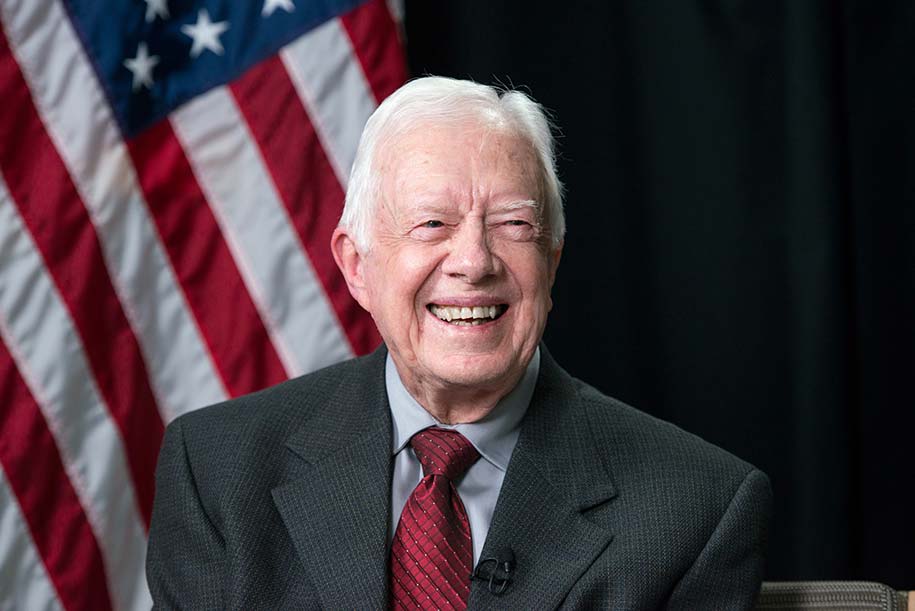As Jimmy Carter marks his sixth month in hospice care, the provider community is raising awareness by saluting the former president.
The National Hospice and Palliative Care Organization (NHPCO) convened a group of hospice leaders at Times Square in New York City to commemorate Carter’s hospice experience. Some hospice executives have said they believe that his example will prompt more Americans to learn more about this form of end-of-life care.
“Once again leading by example, [the Carter family] is showing us how to embrace a stage of life that people don’t want to think about — that people don’t want to talk about,” NHPCO COO and interim CEO Ben Marcantonio said at the Times Square event. “They’re showing us how hospice helps patients live life to the fullest to the end of life, and that’s why we’re gathered here today to publicly thank President Carter and his family.”
The Carter Center, a nonprofit human rights and health organization founded by the former president and his family, announced in February that he would enter hospice care in a brief statement.
Hospice is indelible to Carter’s legacy as president. The federal payment model demonstration that led to the founding of the Medicare Hospice Benefit began during his tenure in the White House.
The Health Care Financing Administration (HCFA) in 1979 launched the demo with 26 providers in 16 states to establish a clear definition of hospice as well as assess the cost-effectiveness of those services. HCFA was later reorganized as the U.S. Centers for Medicare & Medicaid Services (CMS).
The benefit’s founding catapulted hospice growth. In 2021 alone, more than 1.7 million Medicare decedents received hospice care, CMS reported.
“The hospice approach is different from any other approach in health care, and we’re so lucky for that,” Jacqueline Lopez-Devine, chief clinical officer for Gentiva Health Services, said in Times Square. “We put patients and their goals at the center of the plan of care. And with that approach, we’re able to help people live their lives as they would want in the last weeks and months of their lives.”
 NHPCO
NHPCOCarter’s hospice stay, now extending beyond six months, underscores the benefits for patients who enroll in hospice earlier in their disease trajectory, according to Lopez-Devine
The median length of stay for hospice patients was 18 days in 2020, though many patients still receive care for only a few days.
“One of the comments that we hear quite frequently in hospice is [patients and families] wish that they would have heard about hospice sooner,” Lopez-Devine said. “As hospice providers and as clinicians, we wish that patients would elect hospice sooner, so that we would have more time to manage their pain, so that we would have more time to reduce their stress and really help them focus on what matters most to them in the time that they have left.”
Despite years of scrutiny over the duration of hospice care, recent data show that longer stays reduce health care costs in the last year of life by as much as 11%, according to a joint report, from NHPCO, the National Association for Home Care & Hospice (NAHC) and NORC at the University of Chicago.
Hospice care — regardless of length of stay — saves Medicare approximately $3.5 billion for patients in their last year of life, a 3.1% reduction. But those with stays of six months or more yielded the highest percentage of savings.
Recently, questions about appropriate lengths of stay have emerged as a contentious issue. Regulators generally consider stays that go beyond six months to be red flags, including CMS and the U.S. Department of Health & Human Services Office of the Inspector General (HHS-OIG).
By choosing hospice, Carter has helped a wider swathe of the population better understand the nature of hospice, Susan Lloyd, president and CEO of Delaware Hospice said at the New York event.
“Even with the growth of hospice care, only half of eligible Medicare beneficiaries are taking advantage of this option. I think that it’s due in part to the lack of awareness, and in part due to misconceptions about hospice,” Lloyd said. “Increasing awareness and addressing these misconceptions takes open conversations. By choosing hospice care and sharing that choice with the American public, President Carter and his family are helping to educate people, and shedding light on the hospice experience.”
Companies featured in this article:
Delaware Hospice, Gentiva Health Services, National Association for Home Care and Hospice, National Hospice and Palliative Care Organization, NORC at the University of Chicago



